|
|
|
Sort Order |
|
|
|
Items / Page
|
|
|
|
|
|
|
| Srl | Item |
| 1 |
ID:
172426
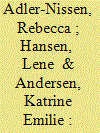

|
|
|
|
|
| Summary/Abstract |
How are images, emotions, and international politics connected? This article develops a theoretical framework contributing to visuality and emotions research in International Relations. Correcting the understanding that images cause particular emotional responses, this article claims that emotionally laden responses to images should be seen as performed in foreign policy discourses. We theorise images as objects of interpretation and contestation, and emotions as socially constituted rather than as individual ‘inner states’. Emotional bundling – the coupling of different emotions in discourse – helps constitute political subjectivities that both politicise and depoliticise. Through emotional bundling political leaders express their experiences of feelings shared by all humans, and simultaneously articulate themselves in authoritative and gendered subject positions such as ‘the father’. We illustrate the value of our framework by analysing the photographs of Alan Kurdi, a three-year-old Syrian-Kurdish boy who drowned in September 2015. ‘Kurdi’ became an instant global icon of the Syrian refugee crisis. World leaders expressed their personal grief and determination to act, but within a year, policies adopted with direct reference to Kurdi's tragic death changed from an open-door approach to attempts to stop refugees from arriving. A discursive-performative approach opens up new avenues for research on visuality, emotionality, and world politics.
|
|
|
|
|
|
|
|
|
|
|
|
|
|
|
|
| 2 |
ID:
108242
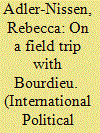

|
|
|
| 3 |
ID:
117437
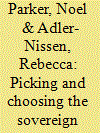

|
|
|
|
|
| Publication |
2012.
|
| Summary/Abstract |
We argue that the continued persistence of borders is an effect of their constitutive role for the many dimensions of a social particular. States cannot choose to have a border; but they can and do make choices amongst the materials available on the various planes of inscription for bordering. For contemporary states the planes have become increasingly disaggregated, in the sense that they do not fall into place at one and the same border. Thus, states have to pick and choose different articulations (often inconsistently) on different planes. We illustrate these ideas with instances, present-day and historical, of bordering. A corollary of there being more need to pick and choose is that articulations of sovereignty change. So, sovereignty is increasingly the material of 'sovereignty games', where sovereignty is used as a political instrument. In sum, our theory directs attention to state bordering on different planes of inscription.
|
|
|
|
|
|
|
|
|
|
|
|
|
|
|
|
| 4 |
ID:
178579
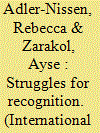

|
|
|
|
|
| Summary/Abstract |
The Liberal International Order (LIO) is currently being undermined not only by states such as Russia but also by voters in the West. We argue that both veins of discontent are driven by resentment toward the LIO's status hierarchy, rather than simply by economic grievances. Approaching discontent historically and sociologically, we show that there are two strains of recognition struggles against the LIO: one in the core of the West, driven by populist politicians and their voters, and one on the semiperiphery, fueled by competitively authoritarian governments and their supporters. At this particular moment in history, these struggles are digitally, ideologically, and organizationally interconnected in their criticism of LIO institutions, amplifying each other. The LIO is thus being hollowed out from within at a time when it is also facing some of its greatest external challenges.
|
|
|
|
|
|
|
|
|
|
|
|
|
|
|
|
| 5 |
ID:
141052
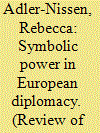

|
|
|
|
|
| Summary/Abstract |
National diplomacy is challenged by the rise of non-state actors from transnational companies to non-governmental organisations. In trying to explain these challenges, scholars tend to either focus on a specific new actor or argue that states will remain the dominant diplomatic players. This article develops an alternative Bourdieu-inspired framework addressing symbolic power. It conceptualises diplomacy in terms of a social field with agents (field incumbents and newcomers alike) who co-construct and reproduce the field by struggling for dominant positions. The framework is applied to the EU's new diplomatic service (the European External Action Service, EEAS), which is one of the most important foreign policy inventions in Europe to date. I show that the EEAS does not challenge national diplomacy in a material sense – but at a symbolic level. The EEAS questions the state's meta-capital, that is, its monopoly of symbolic power and this explains the counter-strategies adopted by national foreign services. The struggles to define the ‘genuine’ diplomat reveal a rupture in the European diplomatic field, pointing towards a transformation of European statehood and the emergence of a hybrid form of diplomacy. A focus on symbolic power opens up new avenues for the study of transformations of authority in world politics.
|
|
|
|
|
|
|
|
|
|
|
|
|
|
|
|
| 6 |
ID:
168545
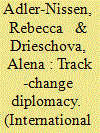

|
|
|
|
|
| Summary/Abstract |
How does technology influence international negotiations? This article explores “track-change diplomacy,” that is, how diplomats use information and communication technology (ICT) such as word processing software and mobile devices to collaboratively edit and negotiate documents. To analyze the widespread but understudied phenomenon of track-change diplomacy, the article adopts a practice-oriented approach to technology, developing the concept of affordance: the way a tool or technology simultaneously enables and constrains the tasks users can possibly perform with it. The article shows how digital ICT affords shareability, visualization, and immediacy of information, thus shaping the temporality and power dynamics of international negotiations. These three affordances have significant consequences for how states construct and promote national interests; how diplomats reach compromises among a large number of states (as text edits in collective drafting exercises); and how power plays out in international negotiations. Drawing on ethnographic methods, including participant observation of negotiations between the European Union's member states, as well as in-depth interviews, the analysis casts new light on these negotiations, where documents become the site of both semantic and political struggle. Rather than delivering on the technology's promise of keeping track and reinforcing national oversight in negotiations, we argue that track-change diplomacy can in fact lead to a loss of control, challenging existing understandings of diplomacy.
|
|
|
|
|
|
|
|
|
|
|
|
|
|
|
|
| 7 |
ID:
182614


|
|
|
|
|
| Summary/Abstract |
The European refugee crisis has been communicated visually through images such as those of Alan Kurdi lying dead on the beach, by body bags on the harbor front of Lampedusa, by people walking through Europe and by border guards and fences. This article examines the broader visual environment within which EU policy-making took place from October 2013 to October 2015. It identifies ‘tragedy’ as the key term used by the EU to explain its actions and decisions and points out that discourses of humanitarianism and border control were both in place. The article provides a theoretical account of how humanitarianism and border control might be visualized by news photography. Adopting a multi-method design and analyzing a dataset of more than 1000 photos, the article presents a visual discourse analysis of five generic iconic motifs and a quantitative visual content analysis of shifts and continuity across four moments in time. The article connects these visual analyses to the policies and discourses of the EU holding that the ambiguity of the EU’s discourse was mirrored by the wider visual environment.
|
|
|
|
|
|
|
|
|
|
|
|
|
|
|
|
| 8 |
ID:
145561
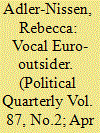

|
|
|
|
|
| Summary/Abstract |
The EU is divided between member states that have adopted the euro and those that have not. This article looks at the issue of differentiated integration with particular reference to eurozone integration and the euro-outsiders. I explore the recent public debate in the UK on euro-outsiderness, comparing this with debates in Denmark. The article highlights some striking differences between the UK and Denmark when it comes to the actual management of euro-outsiderness in Brussels as well as some of the dilemmas facing euro-outsiders such as the UK, Denmark, Sweden and Poland as the EU struggles to exit its crises. Finally, I discuss the future of two-speed European integration and the UK's possible exit from the EU. The UK cannot escape the dilemma of favouring either influence or autonomy; whether the UK remains in or leaves the EU, it will need to allow the eurozone to proceed in order to prevent further eurozone crises.
|
|
|
|
|
|
|
|
|
|
|
|
|
|
|
|
|
|
|
|
|